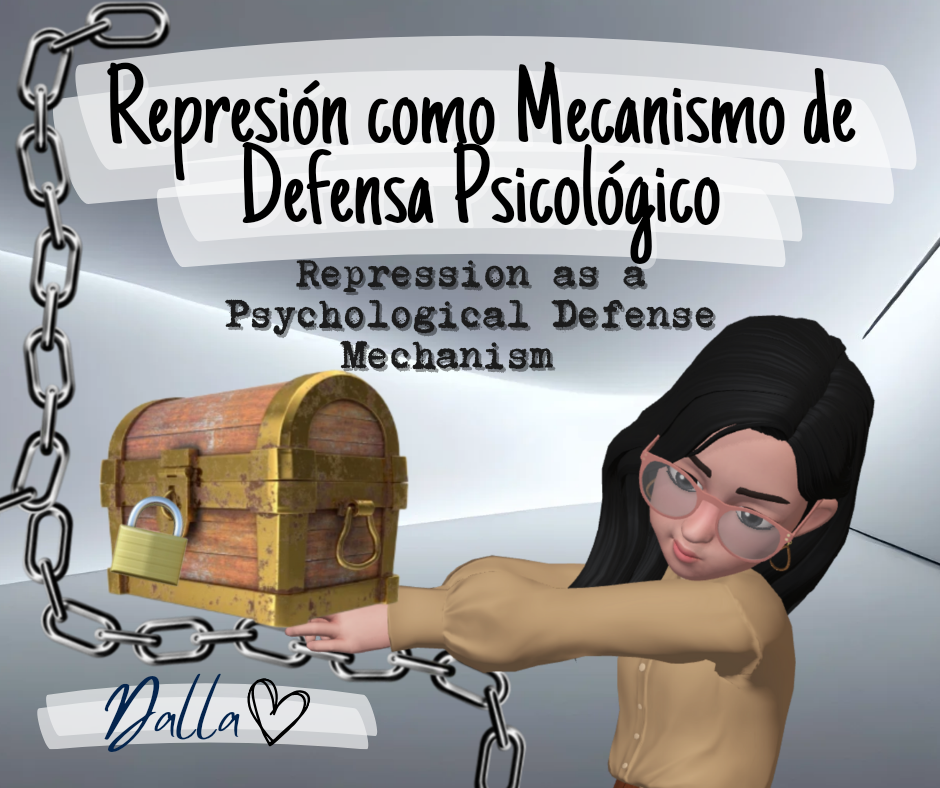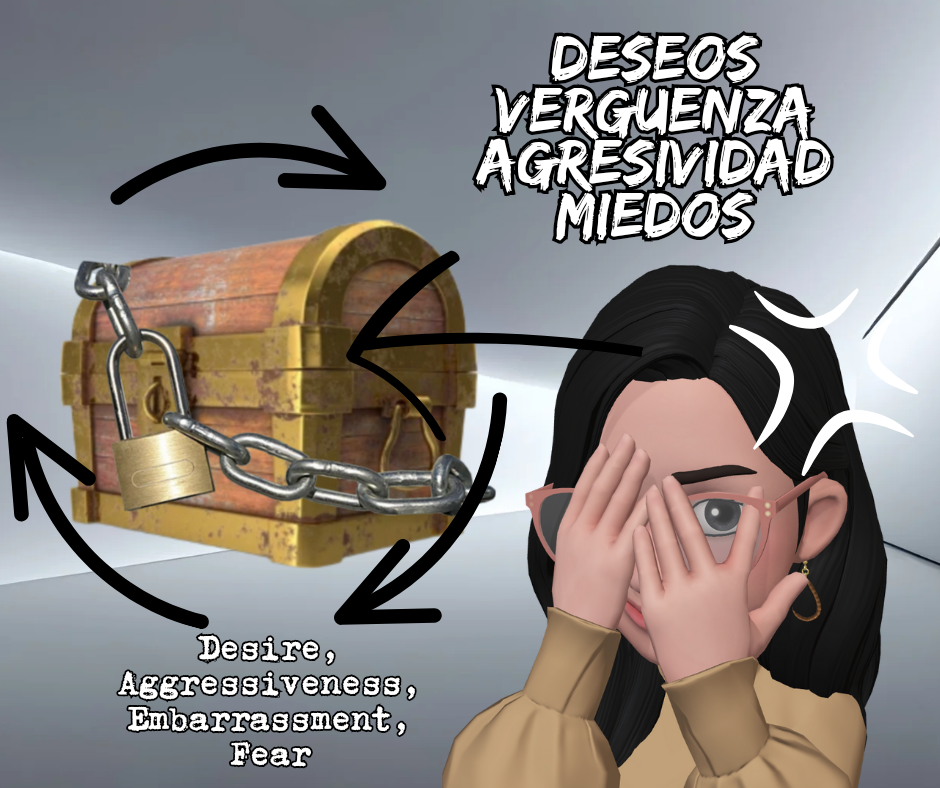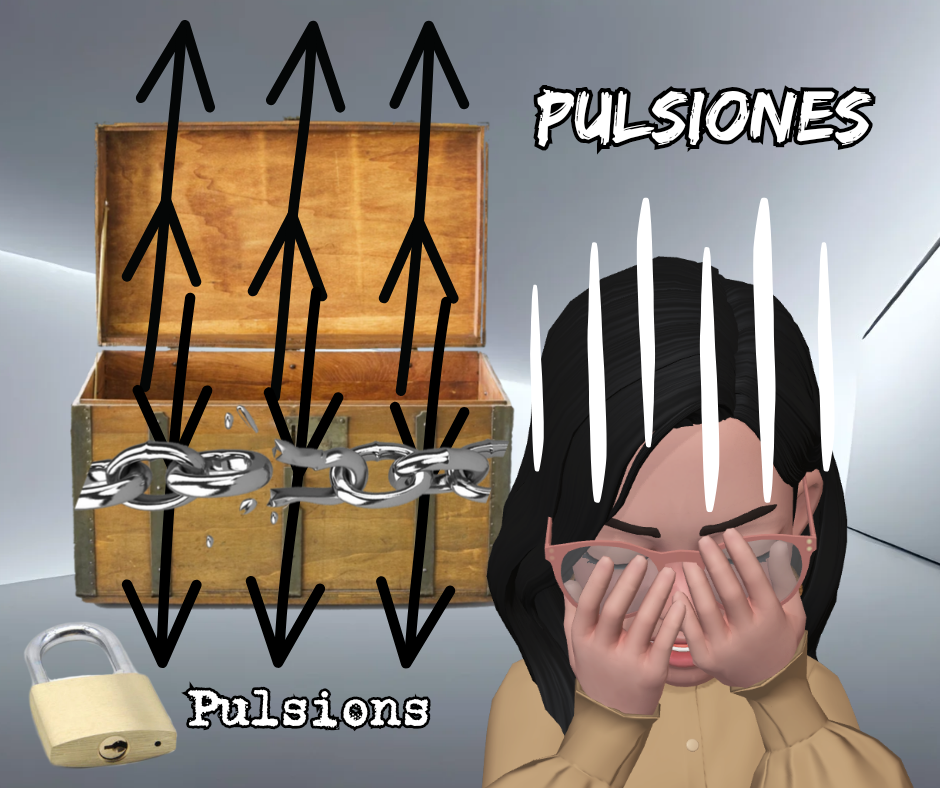

Supongo que han escuchado la típica frase *"Esa persona está reprimiendo lo que siente"* cuando vemos a alguien pasar por un momento difícil y verse externamente bien y tranquila ¿Cierto? Muy probablemente esta persona esté haciendo uso de un **Mecanismo de Defensa Psicológico** y hoy vengo a hablarles de él: **La Represión**.
>I guess you have heard the typical phrase *"That person is repressing what he/she feels "*when we see someone going through a difficult time and looking outwardly good and calm, right? Very probably this person is making use of a **Psychological Defense Mechanism** and today I come to tell you about it: **Repression**.

Cuando hablamos de *Represión* nos referimos a exactamente a eso que dice esa frase, a *"Reprimir"*, es decir a guardar, almacenar o, en términos sencillos, desaparecer de la vista, básicamente es eliminar ese factor de la consciencia porque nos produce malestar y dejarlo bajo llave en el inconsciente donde "Se supone" no nos va a molestar más.
Y Digo "Se supone" porque la realidad es que es algo que siempre va a pulsar por salir, es algo que tarde o temprano encontrará la forma de exteriorizarse y mientras no lo haga causará una gran cantidad de malestares físicos y psicológicos en la persona que está usando el mecanismo.
Usualmente lo que se reprime es información con la que no nos sentimos cómodos, bien sea alguna cualidad o un sentimiento que nos ha generado un hecho, pero que no queremos asumir.
>When we talk about *Repression* we refer to exactly what that phrase says, to *"Repress"*, that is to keep, store or, in simple terms, disappear from sight, basically is to eliminate that factor of consciousness because it produces discomfort and leave it locked in the unconscious where "It is assumed" it will not bother us anymore.
>And I say "it is supposed" because the reality is that it is something that will always push to come out, it is something that sooner or later will find a way to externalize itself and while it does not, it will cause a great amount of physical and psychological discomfort in the person who is using the mechanism.
>Usually what is repressed is information with which we do not feel comfortable, either a quality or a feeling that has generated a fact, but that we do not want to assume.



Cuando hablamos de características propias o de cualidades, nos referimos frecuentemente a niveles de agresividad, y a deseos sexuales, con los cuales la persona no se siente cómoda y guarda para que no les genere la incomodidad que acostumbra sentir cuando los expresa.
Cuando nos referimos a los sentimientos generados por un hecho, nos referimos a un evento que tenga una significancia en la vida de la persona y que represente un punto de quiebre en su vida con gran componente emocional, dado principalmente por el dolor, la vergüenza, la rabia, generados en eventos traumáticos, los cuales son sentimientos con los que muchas veces el ser humano no acostumbra a estar cómodo y por ende intenta ocultar.
La represión representa uno de los Mecanismos de Defensa más importantes, ya que a partir de ella se desarrollan otros muchos más, puesto que su función principal es llevar una información que debería estar en la conciencia al inconsciente para que el individuo siga manejándose como un ser socialmente aceptable bajo sus propios términos de aceptabilidad.
El asunto con este mecanismo de defensa es que, al reprimir las emociones o impulsos, tal vez, se sentirán bien por un momento, que puede ser un periodo corto o mediano de tiempo, pero usualmente esto que queda reprimido intentará salir a la superficie cuando la actualidad corresponda o tenga semejanza con eso que ocasionó la represión.
>When we talk about characteristics or qualities, we often refer to levels of aggressiveness, and sexual desires, with which the person does not feel comfortable and keeps them so that they do not generate the discomfort they usually feel when they express them.
>When we refer to the feelings generated by a fact, we mean an event that has a significance in the life of the person and that represents a breaking point in his life with a great emotional component, mainly given by pain, shame, rage, generated in traumatic events, which are feelings with which many times the human being is not used to be comfortable and therefore tries to hide.
>Repression represents one of the most important Defense Mechanisms, since from it many others are developed, since its main function is to take information that should be in the consciousness to the unconscious so that the individual continues to manage himself as a socially acceptable being under his own terms of acceptability.
>The issue with this defense mechanism is that, when repressing emotions or impulses, perhaps, they will feel good for a moment, which can be a short or medium period of time, but usually this that remains repressed will try to come to the surface when the actuality corresponds or has similarity with that which caused the repression.



Existen muchos casos en que esto que queda reprimido sale a la superficie en circunstancias que parecen no tener relación evidente, hasta que se hace un profundo psicoanálisis y es en ese momento donde la correlación surge y se hace evidente, como por ejemplo con las fobias donde mucho de lo eso a lo que se le tiene un miedo irracional parece no tener sentido, ni se tiene idea del momento de la vida en la que se generó la repulsión a ese factor desencadenante.
Existen otros casos donde sí se puede tener una idea del origen de la represión, ya que la falta de respuesta ante estímulos determinados, que deberían ocasionar respuestas, pueden dar indicios de que es ese elemento el causante, todo esto podría señalar que hubo algún evento traumático en el pasado que no se supo manejar y que de forma involuntaria está pasando a esa parte de nuestra mente a la que no tenemos acceso, tal es el caso de la falta de acción de una persona ante la violencia de otros o la ausencia de expresión de emociones ante un evento que debería ser doloroso, como la muerte de un familiar cercano, por ejemplo.
De todas formas, lo importante es entender que al igual que con la mayoría de los Mecanismos de Defensa Psicológicos nada que se reprima quedará guardado establemente en el inconsciente, las emociones y las pulsiones deben ser aceptadas y aprender a ser manejadas, porque de lo contrario saldrán expuestas de la peor forma posible y en muchos casos las consecuencias tanto físicas como emocionales serán aún peor de lo que ellas representan.
Como siempre mis queridos hivers, espero que estos post sean de ayuda a quienes buscan educarse a sí mismo, los que buscan realizar introspección y comprender de dónde podrían venir sus problemas emocionales o físicos, la idea es que la psicoeducación esté a la mano de todos y que si tienen alguna pregunta me la hagan saber en los comentarios.
>There are many cases in which what remains repressed comes to the surface in circumstances that seem to have no evident relation, until a deep psychoanalysis is done and it is at that moment where the correlation emerges and becomes evident, as for example with phobias where much of what one has an irrational fear of seems to have no sense, nor does one have any idea of the moment of life in which the repulsion to that triggering factor was generated.
>There are other cases where it is possible to have an idea of the origin of the repression, since the lack of response to certain stimuli, which should cause responses, can give indications that this element is the cause, All this could indicate that there was some traumatic event in the past that we did not know how to handle and that involuntarily is passing to that part of our mind to which we do not have access, such is the case of the lack of action of a person before the violence of others or the absence of expression of emotions before an event that should be painful, like the death of a close relative, for example.
>Anyway, the important thing is to understand that as with most Psychological Defense Mechanisms nothing that is repressed will remain stably stored in the unconscious, emotions and drives must be accepted and learn to be managed, because otherwise they will be exposed in the worst possible way and in many cases the physical and emotional consequences will be even worse than what they represent.
>As always my dear hivers, I hope these posts will be of help to those who seek to educate themselves, those who seek to introspect and understand where their emotional or physical problems might come from, the idea is that psychoeducation is at the hand of all and if you have any questions let me know in the comments.



**Los abrazo 🫂 y ¡Gracias por pasar y leerme! 💞 | Hug you 🫂 and Thanks for stopping by and reading me!**

***
**Edición de Banners, subtítulos y separadores | Banner, subtitle and separator editing**
Todos los banners fueron creados por @liveofdalla usando Canvas y Picsart con recursos gratuitos de ambas Apps.
(Eng) All the banners were created by @liveofdalla using Canvas and Picsart with free resources from both Apps.
***
**Emoji**
Samsung AR Emoji App.
***
**Traducción | Translate**
[DeepL](https://www.deepl.com/translator)
***
**Mis redes sociales | My social Networks**
|[Twitter](https://twitter.com/DAQUIORX?t=yoHtA2xsHVIhlAFN8WNx7Q&s=09)|
